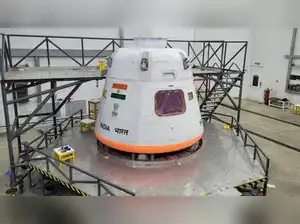India must play a defining role in shaping the future of global space governance, astronaut designates Group Captain P B Nair and Group Captain Angad Pratap said on Wednesday, emphasising that the Gaganyaan mission would mark a "Gaganyaan moment" similar to the Sputnik breakthrough of 1957.
Speaking at the second day of the India International Space Conclave (IISC) 2025, organised by the Indian Space Association (ISpA), Nair said it was the "world's requirement, not just India's", that an Indian goes to space as global rules for space are rewritten.
"We missed the nuclear high table. We missed the UN Security Council high table. This time, when the new laws for space are written, we must be at the high table, representing everyone who is not there right now," he said.
He added that India's presence in space would help embed values of inclusion, equity and global cooperation. "We have always been in space - we were so far ahead that we relaxed for a bit to let the world catch up. Now we must reintegrate our own value systems and Indian knowledge into our space journey," he said.
Astronaut designate Angad Pratap said India has been "very clear" with its space goals, which are backed by strong government support and said sanctioning of an additional budget of Rs 20,000 crore for the Gaganyaan programme and the proposed Bharatiya Antariksha Station conveys that.
"The industry partners have built space for India for five decades without maximising profits. Today, we are at an inflexion point where those investments will yield dividends," he said, adding that human spaceflight was not just about sending astronauts to orbit but also enabling microgravity research and future space tourism.
The conclave ended with a strong pitch for global collaboration, inclusion and competence. Over 1,000 participants attended the two-day event that included astronaut designates, ISRO leaders, officials, foreign dignitaries and startup founders.
In a major development, the European Space Agency (ESA) and ISpA signed a Letter of Intent to enhance collaboration and knowledge-sharing, paving the way for joint research and commercial partnerships.
Former MoS External Affairs Meenakshi Lekhi, the chief guest, said India represented the Global South and must ensure that outer space does not become dominated by a select few.
"We are the originals when it comes to conquering space. If India does well, the world does well," she said.
A S Kiran Kumar, former ISRO chairman, said competence - not claims - earns global recognition. "You will be part of the dialogue on space governance only if you demonstrate capability," he said.
The conclave also witnessed the release of a report on the role of ISAM - In-Space Servicing, Assembly and Manufacturing - in ensuring orbital sustainability and driving the new space economy.
India is preparing for its first human spaceflight in early 2027, with ISRO planning to send two astronauts into low-earth orbit for a few days. The four designated astronauts for the mission are Gp. Capt. Prasanth Balakrishnan Nair, Gp. Capt. Ajit Krishnan, Gp. Capt. Angad Pratap and Wing Commander Shubhanshu Shukla.
Shukla, 39, became the first Indian to board the International Space Station in July during the Axiom-4 mission - only the second Indian in space after Rakesh Sharma's 1984 flight.
Science and Technology Minister Jitendra Singh, who inaugurated the conclave on Tuesday, said India was rapidly emerging as a preferred destination for global space investment and collaboration.
Speaking at the second day of the India International Space Conclave (IISC) 2025, organised by the Indian Space Association (ISpA), Nair said it was the "world's requirement, not just India's", that an Indian goes to space as global rules for space are rewritten.
"We missed the nuclear high table. We missed the UN Security Council high table. This time, when the new laws for space are written, we must be at the high table, representing everyone who is not there right now," he said.
He added that India's presence in space would help embed values of inclusion, equity and global cooperation. "We have always been in space - we were so far ahead that we relaxed for a bit to let the world catch up. Now we must reintegrate our own value systems and Indian knowledge into our space journey," he said.
Astronaut designate Angad Pratap said India has been "very clear" with its space goals, which are backed by strong government support and said sanctioning of an additional budget of Rs 20,000 crore for the Gaganyaan programme and the proposed Bharatiya Antariksha Station conveys that.
"The industry partners have built space for India for five decades without maximising profits. Today, we are at an inflexion point where those investments will yield dividends," he said, adding that human spaceflight was not just about sending astronauts to orbit but also enabling microgravity research and future space tourism.
The conclave ended with a strong pitch for global collaboration, inclusion and competence. Over 1,000 participants attended the two-day event that included astronaut designates, ISRO leaders, officials, foreign dignitaries and startup founders.
In a major development, the European Space Agency (ESA) and ISpA signed a Letter of Intent to enhance collaboration and knowledge-sharing, paving the way for joint research and commercial partnerships.
Former MoS External Affairs Meenakshi Lekhi, the chief guest, said India represented the Global South and must ensure that outer space does not become dominated by a select few.
"We are the originals when it comes to conquering space. If India does well, the world does well," she said.
A S Kiran Kumar, former ISRO chairman, said competence - not claims - earns global recognition. "You will be part of the dialogue on space governance only if you demonstrate capability," he said.
The conclave also witnessed the release of a report on the role of ISAM - In-Space Servicing, Assembly and Manufacturing - in ensuring orbital sustainability and driving the new space economy.
India is preparing for its first human spaceflight in early 2027, with ISRO planning to send two astronauts into low-earth orbit for a few days. The four designated astronauts for the mission are Gp. Capt. Prasanth Balakrishnan Nair, Gp. Capt. Ajit Krishnan, Gp. Capt. Angad Pratap and Wing Commander Shubhanshu Shukla.
Shukla, 39, became the first Indian to board the International Space Station in July during the Axiom-4 mission - only the second Indian in space after Rakesh Sharma's 1984 flight.
Science and Technology Minister Jitendra Singh, who inaugurated the conclave on Tuesday, said India was rapidly emerging as a preferred destination for global space investment and collaboration.





